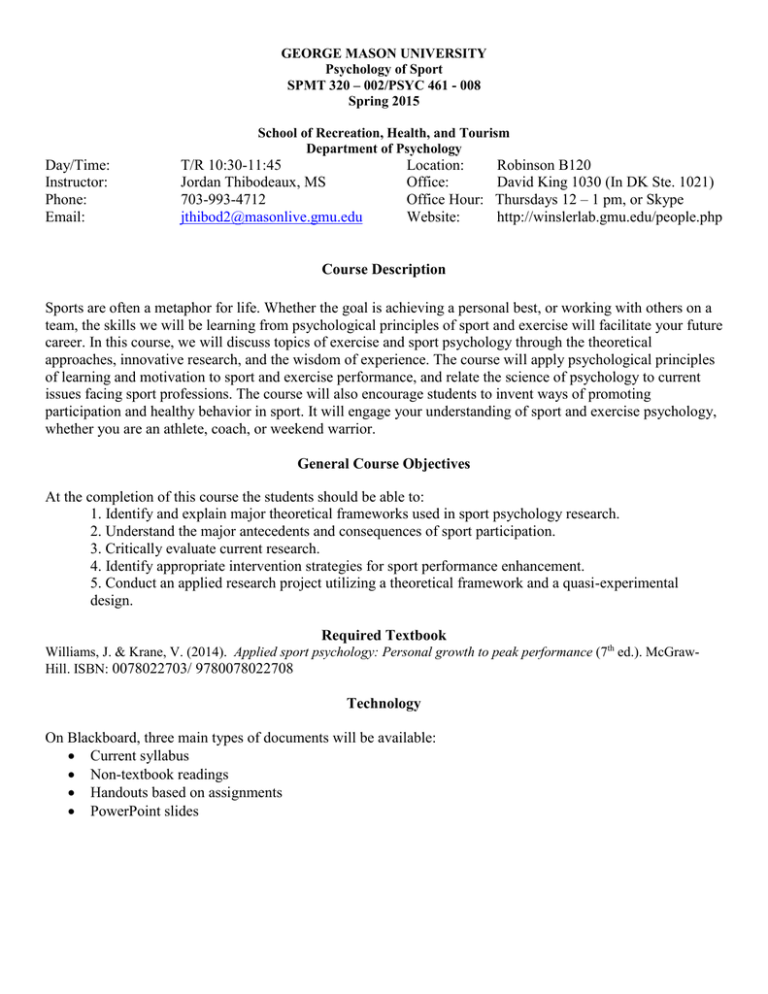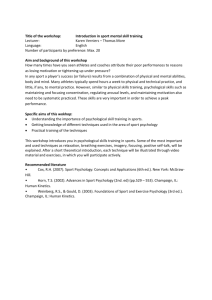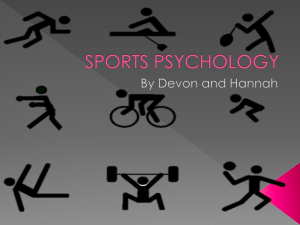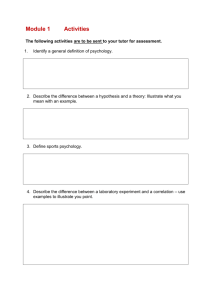Psyc 313-002 - Child Psychology
advertisement

GEORGE MASON UNIVERSITY Psychology of Sport SPMT 320 – 002/PSYC 461 - 008 Spring 2015 School of Recreation, Health, and Tourism Department of Psychology Day/Time: Instructor: Phone: Email: T/R 10:30-11:45 Jordan Thibodeaux, MS 703-993-4712 jthibod2@masonlive.gmu.edu Location: Office: Office Hour: Website: Robinson B120 David King 1030 (In DK Ste. 1021) Thursdays 12 – 1 pm, or Skype http://winslerlab.gmu.edu/people.php Course Description Sports are often a metaphor for life. Whether the goal is achieving a personal best, or working with others on a team, the skills we will be learning from psychological principles of sport and exercise will facilitate your future career. In this course, we will discuss topics of exercise and sport psychology through the theoretical approaches, innovative research, and the wisdom of experience. The course will apply psychological principles of learning and motivation to sport and exercise performance, and relate the science of psychology to current issues facing sport professions. The course will also encourage students to invent ways of promoting participation and healthy behavior in sport. It will engage your understanding of sport and exercise psychology, whether you are an athlete, coach, or weekend warrior. General Course Objectives At the completion of this course the students should be able to: 1. Identify and explain major theoretical frameworks used in sport psychology research. 2. Understand the major antecedents and consequences of sport participation. 3. Critically evaluate current research. 4. Identify appropriate intervention strategies for sport performance enhancement. 5. Conduct an applied research project utilizing a theoretical framework and a quasi-experimental design. Required Textbook Williams, J. & Krane, V. (2014). Applied sport psychology: Personal growth to peak performance (7th ed.). McGrawHill. ISBN: 0078022703/ 9780078022708 Technology On Blackboard, three main types of documents will be available: Current syllabus Non-textbook readings Handouts based on assignments PowerPoint slides Course Requirements and Assignments Attendance 5% The easiest way to do well in this class is to simply show up. Exams 60% You will have three non-cumulative exams administered on the date specified in the course schedule. These tests will primarily consist of multiple choice and short answer items. These exams will rely heavily on material covered in class and required readings. The lowest test grade will be dropped. Paper 15% (See Journal Article Review Instructions) You will choose a journal article from a peer-reviewed publication in sport psychology (see list for suggestions), and write an article review. The paper must outside of article readings in the course. The review will consist of a 2 to 3 page, typed paper related to the topics from the syllabus (and discussed in class). The paper should include a brief summary of the article and a discussion of a theoretical construct discussed in the readings or in class and your personal experience or reaction to this idea. Journals should be current. Final Project 20% (See Final Project Instructions) The final project will consist of an administration and presentation (written and oral) of an experimental study that explores some psychological aspect of sport. More information will be provided in a separate, writing project guidelines document. Grading will be based on a rough draft (20% of the total) and a final draft (75% of the total). Final presentations (5% of the total) will also be given at the end of the semester during the day of the scheduled final. Writing projects submitted after the deadlines (rough draft and final) will not be accepted, and students who do so will receive a "0" for the paper grade. Grades will be calculated as follows: >93% = A, 90 – 92 = A87 – 89 = B+, 83 – 86 = B, 80 – 82 = B77 – 79 = C+, 73 – 76 = C, 70 – 72 = C60 – 69 = D < 60 = F The Honor Code Students in this course are expected to behave at all times in a manner consistent with the GMU Honor System and Code. (http://mason.gmu.edu/~montecin/plagiarism.htm). Students are encouraged to study together as much as possible throughout the course, however, no assistance, sharing of information, or discussion of exam items or answers between students may take place. For all work, the name that appears on the paper must be the author. Violations of the Honor Code will not be tolerated in this course and will be immediately reported according to GMU procedures. The instructor reserves the right to use software to determine the extent to which the work is the student’s. The instructor for this course reserves the right to enter a failing grade to any student found guilty of an honor code violation. Miscellaneous The deadlines for adding and dropping classes are as follows: Last Day to Add Classes (Drop with no tuition penalty) - January 7 Last Day to Drop (33% tuition penalty)-February 10 Final Drop Deadline (67% tuition penalty)-February 20 Official Communications via GMU Email: Mason uses electronic mail to provide official information to students. Examples include communications from course instructors, notices from the library, notices about academic standing, financial aid information, class materials, assignments, questions, and instructor feedback. Students are responsible for the content of university communication sent to their mason email account, and are required to activate that account and check it regularly Recording of classroom lectures is not allowed without explicit permission by the instructor. Students may not reproduce (including uploading to the Internet) any portion of the exam. Students who attempt to photograph or in any way capture information about the exam for others’ use will be reported for an honor violation. If you are a student with disability and you need academic accommodations, please see me and contact the Disability Resource Center (DRC) at 709-993-2474. All academic accommodations must be arranged through that office. Life is stressful and we all need a little support sometimes. Students are encouraged to contact Counseling& Psychological Services (3129 Student Union Building I, http://caps.gmu.edu/) at 993-2380 for assistance with any kind of psychological/life problem or crisis situation. I can help with referrals for students with particular counseling needs so please feel free to talk with me for help with anything. This course is cross-listed within the School of Recreation, Health, and Tourism and the Department of Psychology Tentative Schedule Date T R 20 22 Introduction Sport Psychology T 27 Motor Skill Learning R 29 Reinforcement Motivation T JAN Topic FEB 5 T 10 R T R T R 12 17 19 24 26 T MAR R Self-fulfilling Prophecy Ch 1 Ch 2+Kitsantas & Zimmerman (1998) Ch 3+Smith et al. (2009) Ch 4+Coatsworth & Conroy (2007) Ch 5 Leadership Ch 6 Cohesion Ch 7 Exam #1 Discuss Final Projects Peak Performance Goal Setting Arousal / Anxiety Ch 9 Ch 11 Ch 12 Imagery Ch 13 SPRING BREAK NO CLASS Self-Talk Burnout Ch. 14+Hatzigeorgiadis et al. (2011) Ch 21 Injury Ch 22 3 R 3 Read for that class! 5 T/R 10 & 12 T R 17 19 T 24 R T R T 26 31 2 7 APR Movie: Bigger Stronger Faster I Bigger Stronger Faster II Interventions/Skills Programs The Mastery Coach Cultural Competence 16 Counseling Athletes Ch. 19 T 21 Guest Speaker: Dr. Sarah Fischer Reading TBA R 23 Life After Sport Ch. 23 T 28 Exercise Psychology Ch. 24 R 30 9 T 14 R T MAY 12 Journal Article Review Final Project Ideas Exam #2 Ch 16 Ch 17+Smith & Smoll (2009) Ch 18 R Assignment Due Project Updates Exam #3 Final Presentations during final period (10:30 to 1:15) Final Project Due @ 10:30 Supplementary Readings (on Blackboard) Conroy, D. E., & Coatsworth, J. D. (2007). Coaching behaviors associated with changes in fear of failure: Changes in self-talk and need satisfaction as potential mechanisms. Journal of Personality, 75, 383–419. doi:10.1111/j.1467-6494.2006.00443.x Hatzigeorgiadis, A., Zourbanos, N., Galanis, E., & Theodorakis, Y. (2011). Self-talk and sports performance a meta-analysis. Perspectives on Psychological Science, 6(4), 348–356. doi:10.1177/1745691611413136 Kitsantas, A. & Zimmerman, B. (1998). Self-regulation of motoric learning: A strategic cycle view. Journal of Applied Sport Psychology, 10, 220-239. http://dx.doi.org/10.1080/10413209808406390 Smoll, F. L., & Smith, R. E. (2009). Mastery approach to coaching: A leadership guide for youth sports. University of Washington: Seattle, WA. Smith, R. E., Smoll, F. L., & Cumming, S. P. (2007). Effects of a motivational climate intervention for coaches on young athletes’ sport performance anxiety. Journal of Sport & Exercise Psychology, 29(1), 39–59. Journal Article Review Paper: Choose a topic of interest that relates to subjects covered in the class. Choose an article from one of the following journals and write a brief summary of the findings of the study/article, discuss how it relates to class topics and why you are interested in this topic. Be critical of the research or findings…..do the conclusions drawn make sense? Was it a good study and why? How could it be better? Sport Specific Journals: Sport, Exercise, and Performance Psychology (APA Div. 47) - http://www.apadivisions.org/division47/publications/journals/index.aspx ACSM's Health and Fitness Journal - http://www.acsm-healthfitness.org/ Adapted Physical Activity Quarterly http://www.humankinetics.com/products/journals/journal.cfm?id=APAQ American Board of Sport Psychology Journal http://www.americanboardofsportpsychology.org/default.asp?pSec=10&pTyp=Cover&pID=1045 Athletic Insight – http://www.athleticinsight.com/ British Journal of Sports Medicine - http://bjsm.bmjjournals.com/ Coaching Science Abstracts - http://www-rohan.sdsu.edu/dept/coachsci/search.htm Human Movement Science - http://www.elsevier.com/inca/publications/store/5/0/5/5/8/4/ International Journal of Sports Psychology - http://www.swets.nl/backsets/catalogue_result_00470767.htm Journal of Applied Sport Psychology - http://www.tandf.co.uk/journals/tf/10413200.html FINAL PROJECT INSTRUCTIONS: MENTAL TRAINING PROGRAM Get a taste of what it might be like to be a Sport Psychologist. The text discusses many psychological training methods that are typically used to improve performance. Pick a chapter in our text’s Part Two Mental Training for Performance Enhancement or a chapter in Part Three: Implementing Training Programs and create a unique training program. Use the training program on another person (client). A. Your program should be focused on at least two psychological skills (e.g., Arousal Regulation, Imagery, et cetera). Your program must conform to the following requirements: a) You may only work with someone that you know. b) You must submit your program idea to me before you intend to start working with the person (see due date). You may not begin the program until I have approved your techniques. c) Your program must be based on the techniques discussed in our text OR learning in class (mindfulness exercises for example) d) Your program should span 6 to 8 weeks and should include at least one meeting with you and your client each week. During these meetings you should work on the psychological skills, but also seek feedback on the effectiveness of your program from your client. You should include some measure of how well the program works (can be a crude measure or rating scale). B. Your written report must include: a. An introduction that includes background information (e.g., a short bio of your person, your reason for selecting the particular psychological skills that you did, your reason for selecting this particular person, what you hoped to achieve by doing the program with this person, et cetera), b. A body in which you give a detailed account of your procedures and techniques c. A conclusion in which you reflect on the program, telling what you learned, an exit interview with your client in which they give their reaction to your program, and lastly you should give an objective evaluation of your client (e.g., What do they do well? Poorly?). d. Your written report should be in APA style 6th edition, and between 7 to 9 double-spaced typed pages. You should provide your client a copy of your final report; also, you will present your findings from your project to the class at the end of the semester.





